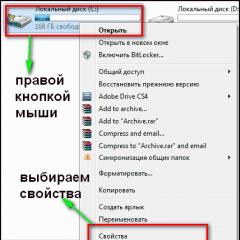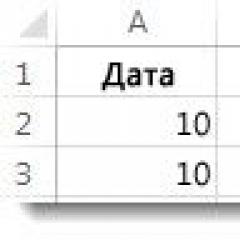What does a domain name mean. Domain name - what is it? Domain name verification. What is cybersquatting and domaining
It would be terribly inconvenient if people addressed each other not by name, but by a number corresponding to a birthday or phone number. Therefore, if names did not exist, they would be worth inventing.
Each computer connected to the global Internet is assigned its own unique number, called IP ADRESS.
Each web resource also has its own IP Address. At the official website of Yandex IP Address 213.180.204.11 This number is difficult to remember, but if you write it in the address bar, the browser will open the Yandex website. The Domain Name of this site is www.yandex.ru corresponding to the IP address 213.180.204.11.
The presence of a domain name, instead of a numerical equivalent, makes it possible to refer to a computer by a name that identifies the owner of the IP address. A domain name functions as a unique name on the Internet and is a simpler and, of course, a more beautiful way to record this address.
Domain name (English domain name) - a unique identifier that is assigned to a specific IP address (there cannot be two identical ones).
Domain Names are maintained and centrally administered by a set of DNS domain name servers. DNS (Domain Name Service) is a domain name service. Along with digital addresses, DNS allows you to use your own computer names, the so-called Domain Names.
All information about Domain Names is stored in a central DNS database, which is a few powerful computers scattered around the world. This database stores information about the date of registration, about the physical or legal owner of the Domain Name, as well as the path to the so-called name server - NAMESERVER, which contains information pointed to by the Domain Name.
A single Internet directory that defines the basis of the DNS is located in the state organization SRI International - Menlo Park, CA, US (Menlo Park, California, USA).
The Domain Name is the literal address of the computer.
Domain Name or literal address of a computer can be:
- Domain name first (top) level - first level domain;
- second-level domain name - second level domain;
- third level domain name. First level domain names are subdivided into:
| Organizational domain first-level names in the US: |
Geographic domain first level names: |
||
| arpa | — Old style Arpanet | af | – Afghanistan (Afghanistan) |
| biz | - businessess (commercial) | ca | — Canada (Canada) |
| com | - commercial (commercial) | cc | — Cocos Islands (Cocos Islands) |
| edu | – US educational (education) | de | — Germany (Germany) |
| gov | - US government (government) | fr | – France (France) |
| int | - international (international) | en | – Russia (Russia) |
| info | — information services | se | – Sweden (Sweden) |
| mil | - US military (US military) | tv | — Tuvalu (Tuvalu) |
| nato | — NATO field (NATO) | UK | — United Kingdom (Great Britain) |
| org | — non-profit organization | zw | — Zimbabwe (Zimbabwe) |
| net | - network (network services) | ws | – Western Samoa (Western Samoa) |
The site www.nic.ru presents all Geographic Domain Names of the first level.
The first-level domain name looks like this - www.ru (Russian Internet zone)
So the second-level domain name is written - www.site
A third-level domain name consists of a second-level domain to which a subdomain is added on the left. For example - noyabrsk.ur.ru ("Noyabrsk.ru" - the site of the city of Noyabrsk)
Greetings, dear readers! In this article, I will try to tell you in simple terms what a domain is and why it is needed. And also, for those who are going to launch their website on the Internet, I will give a few additional instructions that you need to know.
Domain(more accurately called " fully qualified domain name”) is the address of the Internet space (site) on which it is located and where it can be found on the global Internet.If you now go to blog home page and look in the browser line, you will see the following.
This address is called the full domain name of the site. This address may look different in the browser you are using.
- . Many modern browsers hide it.
Prefixes http, https and www do not apply to domains.
A domain name can be compared to the address of any house in the world. Knowing the address, you can find the right house.
In principle, the average user does not need to know more. I hope I have answered your question.
Now let's look at a more advanced technical level.
Definition not for dummies
I'll start with an analogy. Each place on our globe has its own coordinates, according to which it is located. For example, we drove through Volgograd a couple of days ago and visited the famous place Mamaev Kurgan with the highest monument of Russia and Europe “The Motherland Calls!”, Which is located at the coordinates 48°44′32″N, 44°32′14″E48 .742286, 44.537112.
Naturally, we did not look for this place by its coordinates, but by name.

The same thing happens on the global Internet, each place (space) where website data is stored has its own IP address (unique network address). Thus, you can get to the site not only by the domain, but also by its IP address.
For example, if you enter the following IP address 93.158.134.3 in the browser address bar, the Yandex home page will open. But sometimes several sites can be stored at one such address, and so that the user can get to the resource he needs, unique domain names are used in a convenient human form.
It's like apartments in a house at the same address.
Domain name structure
All domain names consist of areas - domains (from English domain is translated as area, territory).
Each name includes a top (first) level domain, it is customary to determine the zone from it. In my case, this is “ru”. Next comes my unique second-level domain “iklife”..website.
It turns out that in this domain zone no one, except me, can locate your site, it belongs only to me.

Again, by analogy, they have a similar structure: country, district, city, street, etc.
04senWhat is a Domain (Domain name)
Site domain or Site domain name is the address of a web resource on the Internet. For example, the site "What is" the domain name looks like this "www.site".
In simple words, domain- this is the name of the site registered on the network, by typing which in the search bar or input , you can go to the required resource. Simple and everyday domain names are in high demand as they are easy to remember, which in turn helps to retain the site's audience.
Why do you need a domain name and why choosing a domain is a very important part when creating a website.
First of all, it is worth noting that a domain name is a kind of visually simplified website address. The fact is that every site on the Internet has its own, which looks like this: 195.191.24.196. I think you will agree that remembering such addresses and entering them into the address bar in order to get to the necessary resource is not the most convenient task. That is why there are domain names that visually replace the numerical values of addresses. In simple words, at the moment when you enter “ ” in the address bar, the computer recognizes the resource location address in this name as “195.191.24.196”, and directs you there.
Since we figured out what domain names are for, let's talk about why choosing a domain name is such an important step in creating a website. It is easy to guess that names that are simple in sound and correspond to the theme of the site will always be of higher priority. The fact is that simple and concise domains are quickly remembered by users, which in turn allows you to quickly find a resource on the Internet. Moreover, if the domain name characterizes the theme of the site, then this in some way affects the promotion of the site in search results. For example, if the site's domain name looks like this "STROYKA.XX", then the user will immediately understand that this site is dedicated specifically to construction sites. In addition, search robots are also able to understand the meaning of words. In this case, when indexing the site, they will place it in a category related to construction.
Domain - zones and levels.
Since we briefly dealt with the names, the next step is to note that domain names include belonging to a particular zone and nesting level. For example, the domain name "website" is a generic second-level domain, since it consists only of the name "chto-takoe" and ".net".
What is the domain level?
For ease of understanding, we can give examples by nesting levels:
- .net - top level(this is purely an indicator of the site's belonging zone);
- site - second level(one name + zone);
- xxxx.site - third level(name + point + name + zone);
- nnnn.xxxx.site - fourth level(name + point + name + point + name + zone).
If everything is clear with the level of nesting, then let's go directly to the zones. Each domain name belongs to a specific zone. In the case of the site "What Is", this is the general international zone ".NET".
There are a huge number of domain zones, and they are divided depending on the region and subject matter. As for regional zones, each country has its own, so for Russia it is “.RU”, for Ukraine it is “.UA”, and for the USA it is “.US”. The following are examples of thematic zones: ".AUDIO", ".MOBI", ".DATE" and the like. There are also international zones, among which the most popular are: ".COM", ".NET", ".INFO", ".BIZ".

Thus, when a person comes up with a name, he registers it in a specific domain zone, which is most consistent with his direction. So business is most often registered in the ".COM", ".BIZ" or national ".RU", ".UA" zones. For information resources more suitable: ".INFO" or ".NET". Although there are no clear rules in this regard, with the exception of areas with certain registration requirements.
How do people make money selling domains?
Some people make a living buying and selling domain names. They usually look for potentially popular but unclaimed names, then register them and try to sell them. For example, certain names tend to become popular after some important events. It could be politics, war, or something else. So the person who owns the given domain name can sell it for a price that is much higher than it was when the original purchase was made.
Categories: , // fromFor a novice website creator, one of the first questions that arises is what a domain is, why it is needed, where to get it and how to choose it. It is present on absolutely any resource, you just have to raise your eyes to the address bar of the browser. The domain name is the name of the site.
Why is it needed?
As a rule, any site is located on the servers of various hosting companies. These servers, like any computer, have their own unique IP address, which consists of numbers in a certain sequence. To search for a site, you need to know this combination of numbers.
The problem is that there can be a thousand sites on one IP address (server), and it is very difficult to find the right one. For easy navigation on the World Wide Web, they came up with a unique name for each resource. Each site is assigned a unique domain name. This greatly facilitates the search for the necessary resource.
Rules for creating a domain name
This is a combination of characters. There are certain rules for its creation:
- The length must be between two and sixty three characters.
- The domain name of the site can contain numbers from 0 to 9.
- It can contain a hyphen, but not at the beginning or end.
- It must not contain spaces.
Any name consists of several parts, which are separated by dots. Each part is domains of different levels. As a rule, three domain levels are used for a site.

Domain levels
They are determined by how many dot-separated words the name contains. First you need to decide on the audience of the resource and, based on this, choose a name.
For the first level, they can be divided into two types:
- Domains that designate a geographic location. They show which country they belong to. For example, domain.ru means that the site belongs to Russia, .ua - to Ukraine, .au - to Australia, .cz - to the Czech Republic, and so on.
- defining the type of activity. The .org domain indicates that the site is non-commercial, .info - informational, .com - created for commerce.
It is worth noting that this classification is rather arbitrary, anyone can register. For example, a site ending in .cz might have nothing to do with the Czech Republic, while a site ending in .com might not do business.
The second-level domain is the unique name of the site. For example, site.ru belongs to an organization or By the way, since the names should not be repeated, when registering, checking a domain name in a certain zone is necessary.
Third level - defines a resource within a second level domain. They are mostly free, but are not very popular among professional webmasters.
What level to choose a domain
If the project is long-term and is designed to make a profit, then you should choose a second-level domain. Yes, it is paid, but it does not cost that much and eliminates the disadvantages that a third-party domain has. Despite the fact that it is free, it has a number of disadvantages:
- The name is lengthened, therefore, it is more difficult to remember.
- As a rule, it is tied to a specific hosting, when you change the latter, you will also have to change the domain.
- Since all services are free, you cannot demand anything from host owners. Anything can happen to the site, and there will even be no one to present claims to.
The third level of the domain can be chosen if the resource is created with the aim of trying your hand and gaining experience.
Also, when choosing, it is worth considering what audience the site is aimed at. If it is Russian-speaking, then you should choose the .ru domain zone. For international or multilingual projects, .com is the best option.

How to choose a name
A domain name is a website, so you should not approach the choice carelessly.
First, the more concise the name, the better. The name should be memorable and not too long. The name can indicate the type of activity, for example avto.com, and it will immediately be clear what information the user will find on the page. But ivan.ru does not reveal much about the subject of the site, only if it is not Ivan's personal blog. If this is an online store, then the domain must contain its name. A name that contains the keyword works well.
Secondly, the name in the domain is mainly written in Latin, so you need to make sure that it is displayed correctly and is readable. You should not expect that all users know English, so there may be problems with writing letters that are not in a foreign alphabet (h, w, y, z).
Third, before using English language, it is necessary to check the correctness of their spelling.
Fourthly, it will not be superfluous to check the domain name to see if there are similar names in other zones. It's okay if there are any, but when this is a competitor resource, the user may mistakenly go to someone else's page.

Domain name registration
You need to register a domain only with reliable partners. You should carefully read the documentation and the capabilities of the seller. You don't need to save money, otherwise troubles may arise later. Domain registration, which costs 99 rubles, looks very suspicious, and in the end, after buying it, you can find that, for example, the administration panel is missing. Or for resale, you will need to provide a pile of documents and perform many actions. As a result, a lot of nerves and strength will go away.
RU-CENTER has been one of the largest registrars in the Russian market since 2001. We provide services for registration, renewal and transfer of support for information about domain names in more than: national, international and thematic.
To enter the query you are interested in in the search bar and click "Check". Free names will appear in the list of results in domain zones with the price for the first year - all available, from the most to the most expensive. Our selection will allow you to check if a particular domain is free if you enter it in its entirety in the search bar.
Choose the appropriate option from the search results by category or the entire list, place and pay for the order. These are valid for the first year of registration and may differ from the cost of the domain upon renewal.
After the receipt of money, the domain name is registered in the central database (Registry) - the administrator indicates the individual or organization that has entered into an agreement with RU-CENTER.
After registration, management and all information about the domain become available in the "For clients" section.



